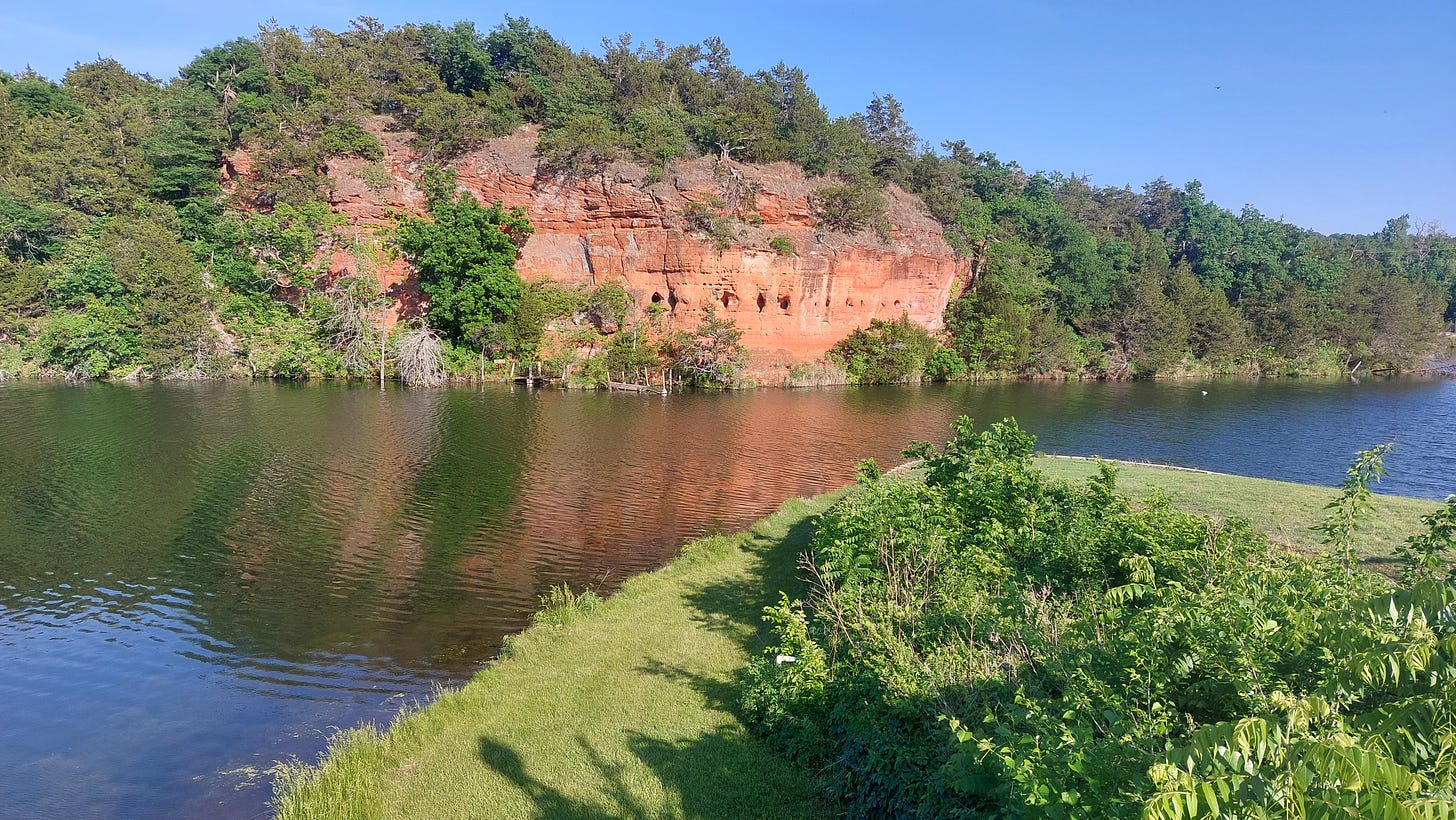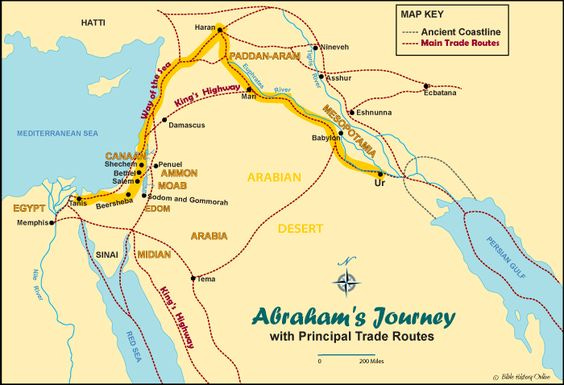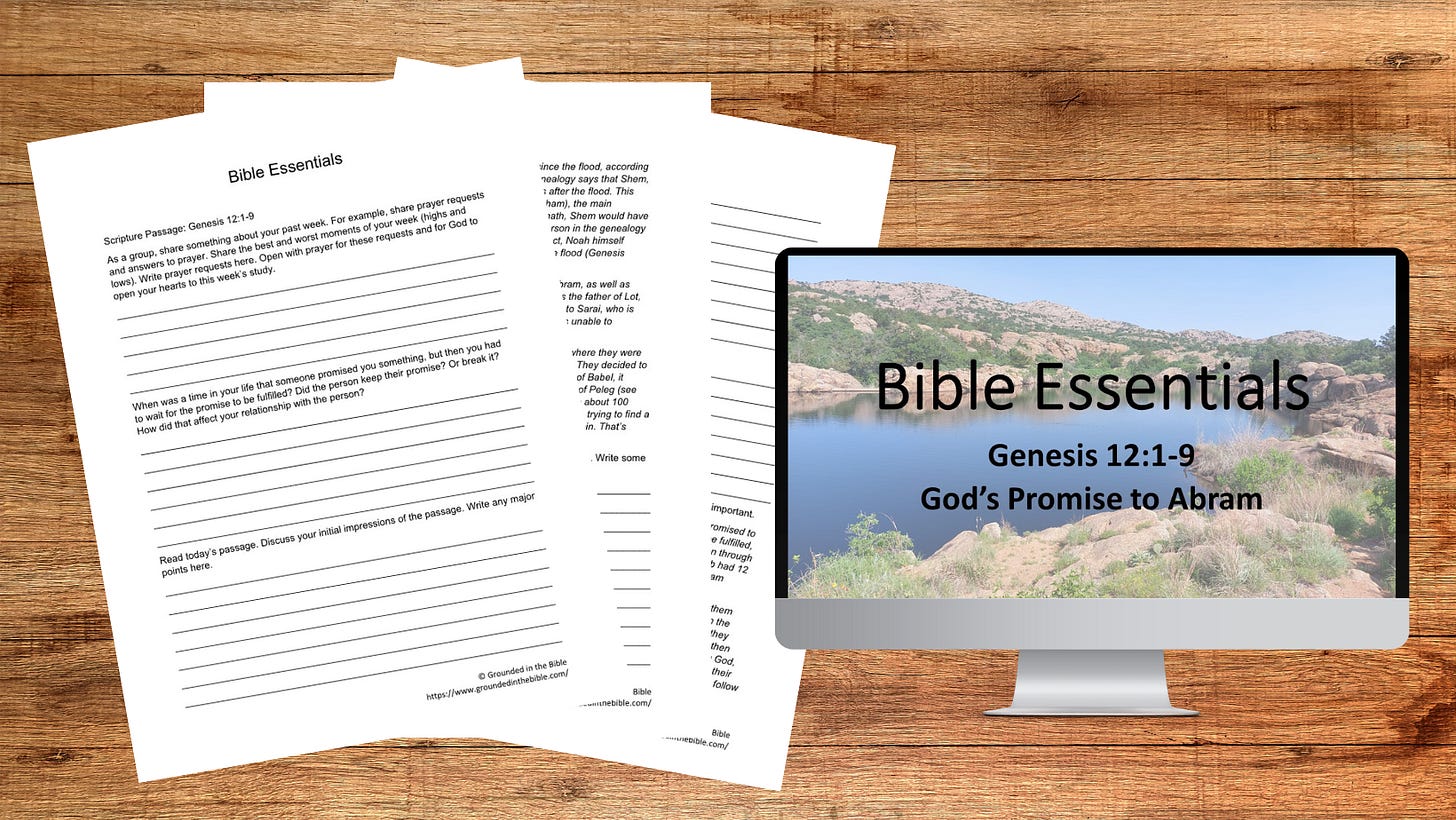Opening
Individuals: Take time to think back about your past week. Where have you seen God work in your life or answer prayer? Write down any prayer requests you have.
Group: Open the study by sharing life updates, reviewing highs and lows of your past week, or sharing prayer requests and praises.
Icebreaker: When was a time in your life that someone promised you something, but then you had to wait for the promise to be fulfilled? Did the person keep their promise? Or break it? How did that affect your relationship with the person?
All: Begin the study with a word of prayer, asking God to open your heart for today’s study. You can also pray for any prayer requests now, or save that for the end.
Study
Read today’s passage: Genesis 12:1-9.
1 The Lord had said to Abram, “Go from your country, your people and your father’s household to the land I will show you.
2 “I will make you into a great nation,
and I will bless you;
I will make your name great,
and you will be a blessing.
3 I will bless those who bless you,
and whoever curses you I will curse;
and all peoples on earth
will be blessed through you.”4 So Abram went, as the Lord had told him; and Lot went with him. Abram was seventy-five years old when he set out from Harran. 5 He took his wife Sarai, his nephew Lot, all the possessions they had accumulated and the people they had acquired in Harran, and they set out for the land of Canaan, and they arrived there.
6 Abram traveled through the land as far as the site of the great tree of Moreh at Shechem. At that time the Canaanites were in the land. 7 The Lord appeared to Abram and said, “To your offspring I will give this land.” So he built an altar there to the Lord, who had appeared to him.
8 From there he went on toward the hills east of Bethel and pitched his tent, with Bethel on the west and Ai on the east. There he built an altar to the Lord and called on the name of the Lord.
9 Then Abram set out and continued toward the Negev.
What is the context for this passage?
By the time we reach Genesis 12, it’s been at least 300 years since the flood, according to the genealogy given in Genesis 11. Keep in mind that the genealogy says that Shem, one of Noah’s sons who was on the ark, lived another 502 years after the flood. This means that Shem would have still been alive when Abram (Abraham), the main character for our next several lessons, was born. Based on the math, Shem would have lived another 200+ years after the birth of Abram. Every single person in the genealogy of Genesis 11 would have been alive when Abram was born. In fact, Noah himself would have still been alive, because Noah lived 350 years after the flood (Genesis 9:28). Kind of blows the mind a bit, right?
Through the genealogy, we are introduced to Terah, the father of Abram, as well as Abram’s two brothers, Haran and Nahor. Abram’s brother Haran was the father of Lot, who we’ll meet later in our study of Genesis. We also are introduced to Sarai, who is Abram’s wife. Genesis 11 also gives us the critical fact that Sarai was unable to conceive, which will become important later in Abram’s story.
Genesis 11 tells us that Terah, Abram, Sarai, and Lot all moved from where they were in Ur of the Chaldeans to go to Canaan. But they didn’t quite get there. They decided to settle in Harran instead. Thinking about this in the timeline of the tower of Babel, it seems that the tower of Babel likely happened sometime during the life of Peleg (see Genesis 10:25). Based on the genealogy in Genesis 11, Peleg was born about 100 years after the flood. So 200+ years later, people are still moving around, trying to find a place to settle. After the death of Terah, God tells Abram to move yet again. That’s where we find him in Genesis 12. If you are a lover of maps like my husband, I included a map below to give you some context for Abram’s travels.
Read the passage again.
Explore a different version if you have one available. If you are online, here is Genesis 12:1-9 in NIV through Bible Gateway. You can change the version by using the dropdown menu at the top right of the page.
Try to summarize the passage in your own words.
Answer these three questions about the passage:
1. What does the passage say about God?
God directs the steps of his people. When God told Abram to move, he didn’t just say, “Pack up all your stuff and go live somewhere else.” No, he said “Go to the land I will show you.” If we are faithful to God, he will show us the way to go in life.
God is the one who blesses the lives of his people. When God blessed Abram, it was very clear that God would be the one who would accomplish all the things that he had promised. It wasn’t dependent on Abram’s actions at all. It was all about God bringing about his purposes for Abram’s life.
God’s blessings pass to others through those who are faithful to him. Part of God’s promise to Abram was that all peoples on earth would be blessed through Abram. Looking in the context of the blessing, it wasn’t necessarily through people interacting with Abram that this blessing would come (although it did for some). This blessing is talking about Abram’s name and the great nation that would come from him. All people on earth are blessed through Abram’s line and Abram’s descendants.
2. What does the passage say about people?
Abram obeyed God’s directions to move to Canaan. When God directed Abram to move away from his country and his father’s family, Abram didn’t hesitate. He just went. Sometimes as humans, we tend to question God or push back on God’s will for us. But Abram trusted God to lead him down the right path.
When people move, they take their family and possessions with them. When Abram set out on his journey, he took his wife and his nephew Lot, along with all of his possessions and the rest of his household. This would give him a good start when he reached his new home.
The Canaanites lived in the land that God promised Abram. When Abram arrived in Canaan, he found that the Canaanites were living in that land. Looking back at Genesis 10, we see that Canaan was from the line of Ham, another one of Noah’s sons. They settled in the land that is west of the Dead Sea and the Sea of Galilee.
Abram worshipped the Lord by building an altar. After God promised to give Abram the land of Canaan, Abram built an altar to the Lord. He did the same thing when he settled east of Bethel. He used these altars to commemorate his interactions with God and to call on the name of the Lord. He sought out a relationship with God, and he didn’t forget the things that God had promised.
3. What does the passage say about God’s plan?
God’s plan was to make Abram into a great nation and to bless him. God selected Abram as the one through whom all of earth would be blessed. God promised to make Abram into a great nation and to bless him. We will see how this comes about through the rest of our study of Genesis.
God’s plan is that he blesses his people so they will be a blessing to others. God promised to make Abram into a great nation and to bless him, but this wasn’t so that Abram could revel in his greatness and wealth. Instead, God intended that Abram would use the blessing from God to in turn bless others. This is God’s intent for all Christians—that we would use the blessings God has given us to bless others.
God’s plan was to give the land of Canaan to Abram’s descendants. In addition to blessing Abram and promising to build him into a great nation, God specifically promised Abram a land for this great nation—the land of Canaan.
How does the passage fit into the overarching story of the Bible?
Sometimes it’s easier to understand a passage if you have a little outside knowledge from other passages in the Bible. This section will help provide that outside perspective.
This story is the foundation for so much of what we read in the Bible. God promised to make Abram into a great nation. It seems at first that this promise wouldn’t be fulfilled, but with 25 years (!!) of patience, God eventually gave Abram and Sarai a son through which this promise would be fulfilled—Isaac. Isaac then had Jacob, and Jacob had 12 sons that would become the nation of Israel. The rest of Genesis is about Abram (Abraham), Isaac, and Jacob (Israel), along with Jacob’s 12 sons.
Then the rest of the Old Testament is about the nation of Israel. God delivered them from slavery in Egypt and led them through the wilderness to eventually settle in the Promised Land, in the land of Canaan, just as God had promised Abram. Once they were settled, the people begged for a king, so God gave them Saul, then David, then Solomon and a whole host of others. The people went through cycles of rejecting God, then repenting and turning back to God. Eventually, they were taken captive, and their lands and homes were taken over by other nations because the people refused to follow God.
Through all of this, God preserved his people because he still had one promise yet to be fulfilled. God promised that all peoples on earth would be blessed through the line of Abram, and that blessing came through the birth, life, death, and resurrection of Jesus. Jesus is the one through whom all people on earth will ultimately be blessed because he has paid the penalty for sin for those who believe in him. Through Jesus, we can have the gift of eternal life. This is the greatest blessing of all!
Discussion
Individual: Answer the following questions thoughtfully for yourself.
Group: Pose these questions for discussion.
All: If you are willing to share, I’d love to hear your thoughts to these questions. Feel free to use the comment section to start a discussion about this passage.
What else strikes you about this passage?
How does the passage affect how you view God? How you view yourself?
How does this passage affect how you will live your life?
Additional Study
For additional study related to this topic, read Genesis 11:10-32 and 2 Corinthians 9:6-15.
Premium Resources
For Bible Essential studies, you can use my thoughts as your devotional, or you can download and use the journaling sheet to work through the passage on your own. If desired, you can then compare your thoughts to mine. Journal sheets can be downloaded and used now or later. They can be printed and filled in by hand or saved and filled out electronically. Journal sheets are available for individual or group use.
If you plan to lead a group study, a PowerPoint presentation is also available.
You can access these resources by clicking here: Genesis 12 Resources
Or you can download the journal sheets here*:
*Substack doesn’t support PowerPoint file downloads yet, so if you want to access the PowerPoint file for group study, you will need to download it from the resource page linked above.





